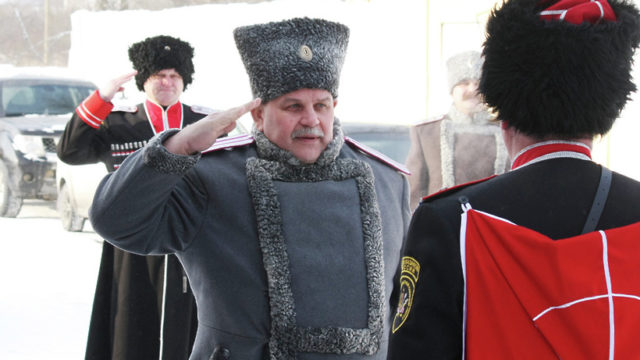
Moscow Wants to Homogenize Cossacks, Destroying Their Distinctive Traditions
Publication: Eurasia Daily Monitor Volume: 15 Issue: 25
By:

The Kremlin is now working to integrate the estimated five million Cossacks of the Russian Federation into Putin’s power vertical, reducing them to a transmission belt for the powers that be by denaturizing and homogenizing one of the most extraordinarily complex social groups in the Russian Federation. Moscow has had some success because it has offered the Cossacks a role in society that many of them may like. However, by overplaying their hand sometimes, the authorities have set the stage for more conflicts with this group, because the center defines what a Cossack must be in ways many Cossacks do not accept.
“Cossack” is the name given to an extraordinary assemblage of peoples whose relations with the state—especially the Soviet one—have often been fraught. They consist of some who had been at the margins of other countries in Eurasia from time immemorial; others who fled from state power; yet a third who were mobilized by the Russian state to engage in building the empire; and still others who since 1991 have identified with this tradition even if they have no direct connection with it. As a result, their relations with the state have been equally complicated: the tsarist state viewed them as useful if unruly allies, the Soviet state attempted to destroy them in the early years and then exploit their tradition during World War II. Most recently, the post-Soviet regime has sought to use them as adjuncts to the police.
Most were and remain Russian Orthodox in religion; a few are Muslim, slightly more are Buddhist, and some even were Jewish despite their role in the anti-Jewish pogroms of the late imperial period, as a recent article has pointed out (Russian7). Nearly all speak Russian, although some Cossacks argue that their language is distinct; and many would like to see their people counted as a separate nationality, something neither the Soviet nor post-Soviet regime has been willing to do.
Both the pre-Soviet and post-Soviet Cossack world in Russia is divided into about a dozen “hosts” led by host atamans who are chosen by their members—thirteen existed in tsarist times, and eleven operate now. These hosts vary in their rules, dress and attitudes toward the Russian state, with some being absolutely obedient and others taking a more independent stance (Nazaccent, February 12). They also vary in their attitudes toward one another, with some favoring an all-Russian unity but most opposed, at least until recently. Now the Russian government has weighed in on the side of the former, and the balance may be changing.
On February 15, at a meeting at Moscow’s Cathedral of Christ the Savior, some 1,500 Cossacks from 80 regions of the country assembled at what was styled as the First Grand Circle (krug) of the Russian Cossacks. The meeting was organized by the Federal Agency for Nationality Affairs (whose head Igor Barinov is a Don Cossack), the Presidential Council for the Cossack Affairs, the Moscow Patriarchate’s committee for relations with the Cossacks and the government of the city of Moscow. The explicit purpose of the sessions was to unify the Cossacks under a single ataman, come out in support of Vladimir Putin’s re-election (having first declared him “the first Cossack of Russia”) and resolve conflicts among the various hosts about their relationship with the state authorities (TASS, January 22; URA, January 30, and VZ.ru, February 18).
At a superficial level, the meeting performed as its organizers hoped, but at a deeper one, things did not go all that well. The meeting did come out in support of Putin and did support the Russian government’s rapprochement with the Cossacks. But two things marred the session. On the one hand, Patriarch Kirill declared to the assembled Cossacks that no one who was not Orthodox could be a Cossack—a position at odds with those who are Buddhists (especially in the Trans Baikal host) and Muslims, and one that many others appear to have been offended by (Forum-msk, February 18).
And on the other hand, the Moscow meeting was not as inclusive as its organizers sought to present it. Many groups, especially those from the Urals host and further afield, were either only very sparsely represented or not represented at all. The Urals Cossacks signaled their distaste for what Moscow is trying to do by ousting an ataman that the Russian authorities had imposed on them at the very time when the meeting in the capital was taking place (URA.news, January 30).
Perhaps even more serious for the future, however, was the sharp attack on the meeting by the most senior Cossack politician in Russia, Viktor Vodolatsky, a Cossack general, who currently serves in the Russian Duma. “The session, which is occurring in Moscow,” he said, “alas does not correspond fully with all the aspirations of the Cossacks, who want to see a mechanism for unifying the Cossacks. This is sad and bad… Russia needs a united Cossack community, and perhaps Barinov, as a Cossack himself, will be able to find a way to promote that” (VZ.ru, February 15).
Moscow is likely to find, however, that unifying under its notions of who is a Cossack—“only the Orthodox”—and who is not is going to be a difficult challenge. After all, one of the origins of the word “Cossacks” is “free men.” And they show little sign of being willing to march in lockstep with anyone but themselves.



